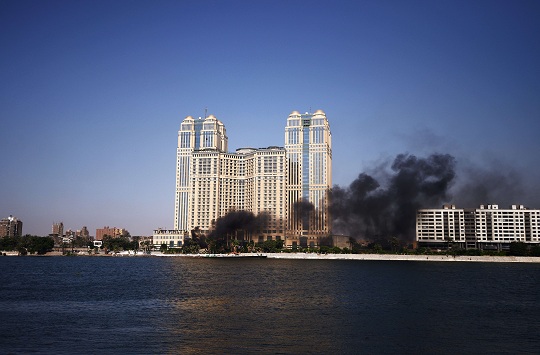
(AFP PHOTO / FABRICE COFFRINI)
AFP- Iranian and Western officials poured cold water Saturday on hopes that a landmark nuclear deal was all but sewn up after world power foreign ministers flew in to join talks with Tehran in Geneva.
“We have now entered a very difficult stage,” Iranian Foreign Minister Mohammad Javad Zarif told state television from the third round of talks in six weeks in Switzerland.
The talks, held in the plush suites of a Geneva hotel, are aimed at securing a freeze on parts of Iran’s nuclear programme in order to ease fears that it will develop atomic weapons, in return for modest sanctions relief.
“They remain very difficult negotiations. I think it is important to stress that we are not here because things are necessarily finished,” British Foreign Secretary William Hague said.
“It’s not a done deal,” said his German counterpart Guido Westerwelle. “We think there’s a realistic chance but there is still a lot of work to do.”
The arrival of foreign ministers including US Secretary of State John Kerry on Saturday raised hopes, after three days of intense negotiations among political directors, that a breakthrough was in sight.
Kerry decided to return to Switzerland “in light of the progress being made” and “with the hope that an agreement will be reached,” the State Department said.
China’s foreign ministry said the talks were “entering their final phase”, while Russia’s top diplomat Sergei Lavrov said that “for the first time in many years” there was a “real opportunity”.
Just two weeks ago, the ministers had jetted in seeking to sign on the dotted line, only to fail as cracks appeared among the powers — fissures that officials say are now repaired.
“It’s the homestretch but preceding negotiations have taught us prudence,” a French diplomat said.
Since being elected in June, Iranian President Hassan Rouhani has raised big hopes that after a decade of rising tensions over Tehran’s nuclear programme a solution might be within reach.
The risks posed by failure are high: Tehran could resume the expansion of its nuclear activities, leading to more painful sanctions and even Israeli and possibly US military action.
The Geneva talks are the third round since Rouhani took office with the permanent five UN Security Council members — the United States, Russia, China, Britain and France — plus Germany, known as the P5+1.
Iran says its nuclear programme is peaceful but many in the international community suspect it is aimed at acquiring atomic weapons.
The six powers want Iran to stop spinning, for six months initially, some of its many thousand centrifuges enriching uranium to levels close to weapons-grade.
They also want Tehran to stop constructing a new reactor at Arak and to grant the International Atomic Energy Agency more intrusive inspection rights.
In return they are offering Iran minor and reversible relief from painful sanctions including unlocking several billion dollars in oil revenues and easing some trade restrictions.
This “first phase” deal would build trust and ease tensions while negotiators push on for a final accord that ends once and for all fears that Tehran will acquire an atomic bomb.
A major sticking point has been Iran’s demand — as expressed by supreme leader Ayatollah Ali Khamenei this week — for recognition of its “right” to enrich uranium.
Getting an agreement palatable to hardliners both in the United States and in the Islamic republic — as well as Israel — is tough.
Many in Israel, widely assumed to have a formidable nuclear arsenal itself, are alarmed about the mooted deal, with Prime Minister Benjamin Netanyahu campaigning vigorously against it.
Netanyahu wants all of Iran’s nuclear infrastructure dismantled, not just parts of it frozen, believing that the P5+1 will leave Iran with an ability to develop nuclear weapons.
In Washington there is a push by lawmakers to ignore President Barack Obama’s pleas and pass yet more sanctions on Iran if there is no deal — or one seen as too soft.
Rouhani meanwhile is under pressure to show Khamenei the first fruits of his “charm offensive”, and it is unclear whether the sanctions relief on offer is enough.


